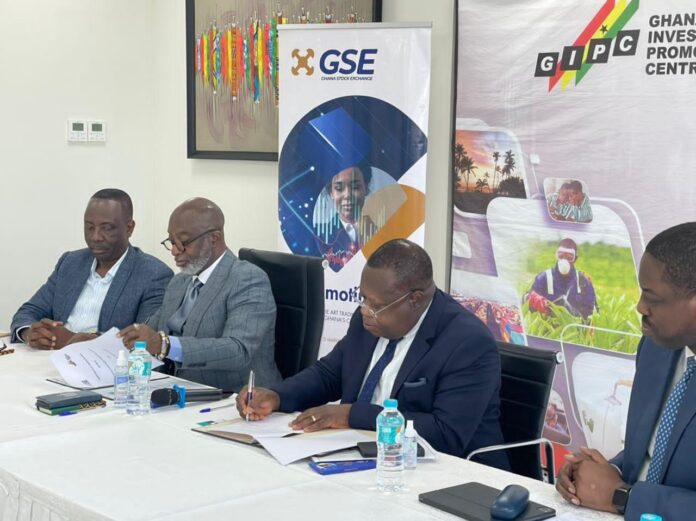
In a move geared toward increasing activity on the local stock market, particularly among Ghanaians in the diaspora, the Ghana Stock Exchange (GSE) has partnered with Ghana Investment Promotion Centre (GIPC) to see the former gain improved access to a wider pool of offshore capital.
Despite the downturn in economic activity as a result of disruptions caused by the pandemic, inward remittances have been on an upward trajectory. In 2021 the nation received some US$4.6billion in diaspora remittances, just under 7 percent of the year’s Gross Domestic Product (GDP).
The move, operators of the local capital market said, is consistent with its goal of transitioning from a frontier market to a more robust emerging market in the medium-term.
During the signing of a Memorandum of Understanding (MoU) to formalise the partnership, Managing Director of GSE, Peterson Ekow Afedzie, explained that the development was coming on the back of a long line of partnerships between both institutions.
Adding that it will serve as a crucial framework for attracting and retaining the growing pool of portfolio and foreign direct investors, he said: “This is consistent with our goal of making Ghana and the GSE a preferred investment destination and platform for raising capital and investing on the continent”.
Data from the recently-released World Investment Report show that FDI inflows into the country grew by 39 percent – from U$1.8billion recorded in 2020 to US$2.6billion at the close of 2021, the second-highest in the West African sub-region.
The GSE MD expects this will be the outcome of collaborative efforts and a crucial step in transitioning the local stock market from a frontier to an emerging market.
“We are looking at becoming an emerging market, one that will be more attractive and get a wide range of companies to list on the exchange. One of the key pillars is the transformation process, and this is evidence that we are on the right track,” he said
Mr. Afedzie further hinted that the partnership will see GSE accelerate the introduction of new products and services which will be especially appealing to Ghanaians in the diaspora – adding that this will present further opportunities for them to contribute in transformation of the economy through their investments.
“Going forward, as an Exchange we will deepen collaboration with the Diaspora Investment Desk and engage Ghanaians in the diaspora to invest in equities to help grow our economy,” Mr. Afedzie said.
Currently, the entire market capitalisation of the Accra bourse is approximately US$8billion (GH¢63billion).
The contribution of domestic investors to equities trade has witnessed an uptick this year – as that of foreign investors dipped to 62 percent between January and June 2022 compared to 68 percent for the same period in 2021 – due to the aggressive 30 percent localisation campaign by MTN.
However, the entire market capitalisation remains relatively small compared to Gross Domestic Product (GDP) at approximately 14 percent; a situation Mr. Afedzie expects the GSE-GIPC partnership to remedy.
“We are emphasising equities as we know that without them it will be difficult for the country to develop, since short-term debt instruments are unsustainable for national development,” he added.
On his part, Chief Executive at the GIPC, Reginald Yofi Grant, said his outfit’s expertise and track record make it the ideal partner for the Exchange as it courts diasporan funds.
“The partnership will serve as a rallying point for investments into the country,” the former investment banker said.
Director General of the Securities and Exchange Commission (SEC), Daniel Ogbarmey Tetteh, stated that the local market is ripe for a surge in FDIs and Foreign Portfolio Investments (FPIs) – both of which he said will work hand-in-hand to transform the economy.
“Ghana is very ripe for both FDIs and FPIs, given the compelling opportunities existing today; and therefore it is time for an even stronger collaborative effort, as we are witnessing between the GSE and GIPC.”









